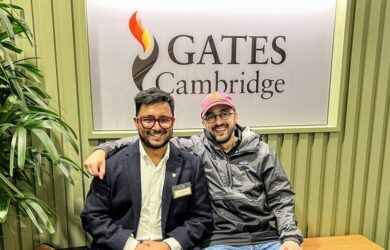
Picture credit: National Institute of Allergy and Infectious Diseases (NIAID) and Wikimedia commons.
A study co-authored by Ramit Debnath looks at how nudge policies and the use of frugal innovation helped India in the lockdown phase of COVID-19.
The application of timely frugal innovations shows a potential model that could be used in the future with regard to climate change.
Ramit Debnath
Charting the way nudge policies used by the Indian government during COVID-19 adapted to rapidly changing circumstances could be effective in mobilising the population to tackle other disruptions like climate change, according to a new study.
The study, India nudges to contain COVID-19 pandemic: a reactive public policy analysis using machine-learning based topic modelling, was published in Computers and Society* and was co-authored by Gates Cambridge Scholar Ramit Debnath and Dr Ronita Bardhan, University Lecturer in Sustainability of the Built Environment at the University of Cambridge.
It used artificial intelligence to track how nudge policies had to adapt to the challenges faced by COVID-19 and may have lessons for India’s strategy for tackling other major disruptions.
India faced a huge challenge in getting its 1.3 billion population to move fast to lockdown in the face of rising cases of COVID-19 and to balance that against economic, social and developmental impacts.
The study did not look at how India controlled the rate of spread of COVID-19 cases, but rather how the country tackled those other impacts caused by the virus. It found that the government used a whole set of policies, drawing in part on Indian culture and tradition rather than imported models.
Using cutting-edge machine learning and AI-based algorithms to study official press releases from the Press Information Bureau of India, the researchers looked at those words used most frequently to devise a picture of how the Government mobilised the public during the pandemic.
Press releases were backed by SMS reminders, the publication of risk maps, repeated reassurances from doctors, frequent public appearances by the Prime Minister, appeals for the public to participate in the fight against the virus through donations to the PM-CARES and appeals to nationalism and solidarity.
This was reinforced by repeated broadcasting of information through multi-media channels, using Bollywood to repeat calls through songs, poems and dramatisation and an appeal to nostalgia invoking the Ramayana and Mahabharata stories to encourage people to stay at home.
The different techniques were used to nudge people towards behaviour that reduced the risk of the virus spreading, such as the compulsory wearing of masks in public spaces, the rapid production of PPE by small businesses, an appeal to use Yoga and Ayurveda to boost immunity, the rapid development of indigenous diagnostic kits and the move to online learning.
The researchers say that a similar nudging-based approach could be useful both during the lifting of lockdown and beyond, providing a way forward for reviving the economy and addressing climate change mitigation goals in the post-COVID era.
Ramit Debnath [2018], who is doing a PhD in Energy Policy in the Behaviour and Building Performance Group, said: “The nudges from the government were to motivate people to adhere to unpleasant rules of quarantine and lockdown with huge economic and social costs. Lockdown was possible due to rapid and aggressive sensitisation to the dangers of COVID-19. People united to move away from business as usual towards frugal innovation-driven strategies to make the best use of their limited resources, for example, old trains were converted into isolation wards due to shortage of hospital space. Similarly, to save smaller businesses aggressive nudges were directed at them to manufacture PPE and masks. The application of timely frugal innovations shows a potential model that could be used in the future with regard to climate change.”
*preprint server/ not peer-reviewed

Ramit Debnath
- Alumni
- India
- 2018 PhD Architecture
- Churchill College
With a background in electrical engineering and computational social sciences, I design collective intelligence approaches to provide a data-driven, complex system-level understanding of barriers to climate action in the Anthropocene, their interactions, and how these translate to leverage points for policy and behavioural interventions at scale. Previously, I held positions at Caltech, Cambridge Computer Laboratory, International Energy Agency, Stanford University and IIT Bombay. I received MPhil and PhD from the University of Cambridge as a Gates Scholar.
Links
https://camcid.github.io
https://www.collectivedesign.group.cam.ac.uk/team.html
https://www.linkedin.com/in/ramit-debnath-b1980a204












